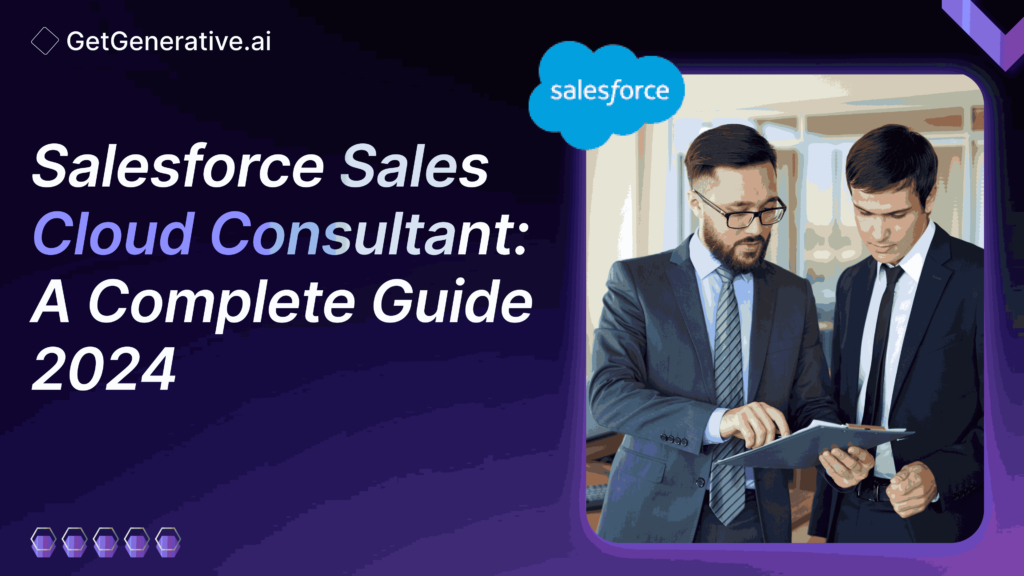Salesforce Sales Cloud Consultant: A Complete Guide 2024
In today’s competitive business landscape, leveraging customer relationship management (CRM) solutions is vital for driving sales and ensuring customer satisfaction. Salesforce Sales Cloud, a leading CRM platform, offers extensive features to enhance sales processes. However, to fully utilize its potential, businesses often need the expertise of a Salesforce Sales Cloud Consultant.
This blog delves into the role of these consultants, the path to becoming one, their benefits, certifications, and much more.
What Does a Salesforce Sales Cloud Consultant Do?
A Salesforce Sales Cloud Consultant plays a pivotal role in optimizing a business’s sales processes through the implementation and customization of Salesforce Sales Cloud. Their responsibilities are multi-faceted and include:
Requirement Analysis
A Salesforce Sales Cloud Consultant begins by thoroughly understanding the business’s sales processes, goals, and pain points. This involves:
- Conducting Interviews and Workshops: Engaging with stakeholders, including sales teams, management, and IT departments, to gather comprehensive insights.
- Documentation: Creating detailed documentation of current processes and desired outcomes.
- Gap Analysis: Identifying discrepancies between the current and desired states to determine necessary changes and enhancements.
Customization and Configuration
Once the requirements are clear, the consultant tailors Salesforce Sales Cloud to meet the business’s specific needs. This includes:
- Configuring Sales Cloud Features: Setting up lead management, opportunity tracking, sales forecasting, and workflow automation.
- Custom Development: Developing custom applications and components using Apex, Visualforce, and Lightning components.
- User Interface Customization: Modifying page layouts, fields, and dashboards to enhance user experience and accessibility.
Data Management
Effective data management is crucial for the success of any CRM implementation. Consultants ensure that:
- Data Migration: Data from legacy systems is accurately transferred to Salesforce, ensuring data integrity and minimizing downtime.
- Data Cleansing: Removing duplicates, correcting inaccuracies, and standardizing data formats to improve data quality.
- Ongoing Data Maintenance: Establishing protocols for data entry, validation, and periodic audits to maintain data accuracy.
Training and Support
For Salesforce Sales Cloud to be effective, users must be well-trained and supported. Consultants provide:
- User Training: Developing and delivering training programs tailored to different user roles, ensuring all team members are proficient with the system.
- Support Materials: Creating user guides, FAQs, and video tutorials to assist users in navigating the system.
- Ongoing Support: Offering post-implementation support, troubleshooting, and system updates to address issues and optimize performance.
Integration
Integrating Salesforce Sales Cloud with other business systems enhances data flow and operational efficiency. Consultants manage:
- API Integrations: Setting up and configuring APIs to connect Salesforce with ERP systems, marketing automation tools, and other third-party applications.
- Custom Integrations: Developing custom middleware solutions for unique integration requirements.
- Monitoring and Maintenance: Continuously monitoring integrations to ensure they function smoothly and troubleshoot any issues that arise.
Also Read – Salesforce Marketing Cloud Consultant: A Complete Guide
How to Become a Salesforce Sales Cloud Consultant?
Becoming a Salesforce Sales Cloud Consultant involves a combination of education, experience, and certification. Here are the steps:
- Educational Background: A degree in computer science, information technology, business administration, or a related field is advantageous.
- Salesforce Platform Familiarity: Gain hands-on experience with the Salesforce platform through training or employment.
- Certification: Obtain relevant Salesforce certifications (discussed in detail below).
- Practical Experience: Work on real-world Salesforce projects to build expertise.
- Continuous Learning: Stay updated with the latest Salesforce updates and industry best practices.
What are the Benefits of Hiring a Salesforce Sales Cloud Consultant?
Hiring a Salesforce Sales Cloud Consultant offers numerous advantages:
- Expertise: Leverage specialized knowledge for optimal Salesforce implementation.
- Customization: Tailor Salesforce to fit your unique business needs.
- Efficiency: Streamline sales processes and improve productivity.
- Cost Savings: Avoid costly mistakes and ensure a return on your Salesforce investment.
- Ongoing Support: Access continuous assistance and updates.
Also Read – Becoming a Salesforce Consultant – The Ultimate Guide
How Does a Salesforce Sales Cloud Consultant Improve Sales Processes?
A Salesforce Sales Cloud Consultant can significantly enhance sales processes by leveraging the robust features of Salesforce Sales Cloud and applying their expertise. Here are specific ways they achieve this:
Automation
Automation reduces manual tasks, minimizes errors, and frees sales teams to focus on high-value activities. Consultants implement:
- Workflow Rules: Automating routine tasks such as follow-up emails, task assignments, and status updates.
- Approval Processes: Streamlining approval workflows for discounts, contracts, and other critical sales documents.
- Sales Cadence: Establishing automated sales cadences to ensure timely follow-ups and consistent prospect engagement.
Insightful Analytics
Salesforce Sales Cloud offers powerful analytics tools that provide actionable insights. Consultants help businesses:
- Custom Reports and Dashboards: Creating tailored reports and dashboards to track key performance indicators (KPIs) such as lead conversion rates, sales pipeline health, and revenue forecasts.
- Predictive Analytics: Utilizing Einstein Analytics to predict sales trends, identify potential upsell opportunities, and uncover customer behavior patterns.
- Data Visualization: Enhancing data presentation with interactive charts and graphs to facilitate better decision-making.
Enhanced Collaboration
Effective collaboration within sales teams is essential for closing deals. Consultants facilitate this by:
- Chatter Integration: Enabling real-time communication and collaboration through Salesforce Chatter, allowing team members to share updates, files, and insights.
- Collaborative Forecasting: Setting up collaborative forecasting tools allows sales teams to work together on sales projections and pipeline management.
- Activity Tracking: Implementing activity tracking features to monitor client interactions, ensuring that all team members are informed and coordinated.
Lead Management
Improving lead management is crucial for boosting sales performance. Consultants optimize this process by:
- Lead Scoring: Implementing lead scoring models to prioritize high-potential leads based on predefined criteria.
- Lead Assignment Rules: Set up automatic lead assignment rules to distribute leads to the appropriate sales representatives based on geography, industry, or other factors.
- Lead Nurturing Campaigns: Integrating with marketing automation tools to create targeted lead nurturing campaigns that move prospects through the sales funnel.
Customer Insights
A comprehensive view of customers enables personalized interactions and stronger relationships. Consultants achieve this by:
- Customer 360: Configuring Salesforce Customer 360 to provide a holistic view of each customer, including their history, preferences, and interactions.
- Segmentation: Creating customer segments based on various attributes to tailor sales and marketing efforts.
- Engagement Tracking: Implementing tools to track customer engagement across multiple touchpoints, providing insights into customer behavior and preferences.
A Salesforce Sales Cloud Consultant helps businesses streamline their sales processes, enhance productivity, and ultimately drive higher sales performance by addressing these key areas.
Also Read – The Ultimate Salesforce Sales and Service AI Cheat Sheet
What Certifications are Required for a Salesforce Sales Cloud Consultant?
Certifications validate a consultant’s expertise and enhance their credibility. Key certifications include:
- Salesforce Certified Administrator: Fundamental skills for administering Salesforce.
- Salesforce Certified Sales Cloud Consultant: Specific knowledge and skills related to Sales Cloud.
- Salesforce Certified Advanced Administrator: Advanced administrative capabilities.
- Salesforce Certified Platform App Builder: Skills in building custom applications on the Salesforce platform.
What is the Average Salary of a Salesforce Sales Cloud Consultant?
The average salary of a Salesforce Sales Cloud Consultant varies based on experience, location, and industry. Generally, it ranges from $80,000 to $130,000 per year. Experienced consultants with specialized skills can earn significantly more.
Is Hiring a Salesforce Sales Cloud Consultant Worth It?
Investing in a Salesforce Sales Cloud Consultant can yield substantial returns through improved sales efficiency, better customer management, and increased revenue. Their value often outweighs the cost, making them a worthwhile investment for many businesses.
Should My Business Invest in a Salesforce Sales Cloud Consultant or an In-House CRM Expert?
Deciding between a Salesforce Sales Cloud Consultant and an in-house CRM expert depends on various factors:
- Budget: Consultants can be more cost-effective for short-term projects, while in-house experts are better for long-term needs.
- Expertise: Consultants bring specialized, up-to-date knowledge, whereas in-house experts may offer broader company-specific insights.
- Flexibility: Consultants provide flexibility for scaling projects up or down without long-term commitments.
Conclusion
A Salesforce Sales Cloud Consultant can significantly enhance your sales processes and drive business growth. Their expertise ensures that your Salesforce investment delivers maximum value from implementation to optimization. Whether you’re considering hiring a consultant or pursuing a career in this field, understanding the role, benefits, and requirements is crucial for making informed decisions.
Enhance your Salesforce consulting with GetGenerative.ai. Effortlessly craft outstanding proposals, enabling you to dedicate more time to providing exceptional client service.
Start today!
Frequently Asked Questions (FAQs)
1. How long does becoming a Salesforce Sales Cloud Consultant take?
It typically takes several months to a few years, depending on prior experience and the time dedicated to learning and certification.
2. Can small businesses benefit from hiring a Salesforce Sales Cloud Consultant?
Yes, consultants can tailor solutions to fit small businesses’ unique needs and budgets, enhancing their sales processes effectively.
3. What is the role of a Salesforce Sales Cloud Consultant in data migration?
They ensure data is accurately and securely transferred from legacy systems to Salesforce, maintaining data integrity and usability.
4. Are online courses available for Salesforce Sales Cloud Consultant certification?
Numerous online courses and resources are available to prepare for Salesforce certifications.
5. How often should a business update its Salesforce Sales Cloud configurations?
Regular updates and optimizations are recommended to leverage new features, maintain security, and adapt to evolving business needs.




